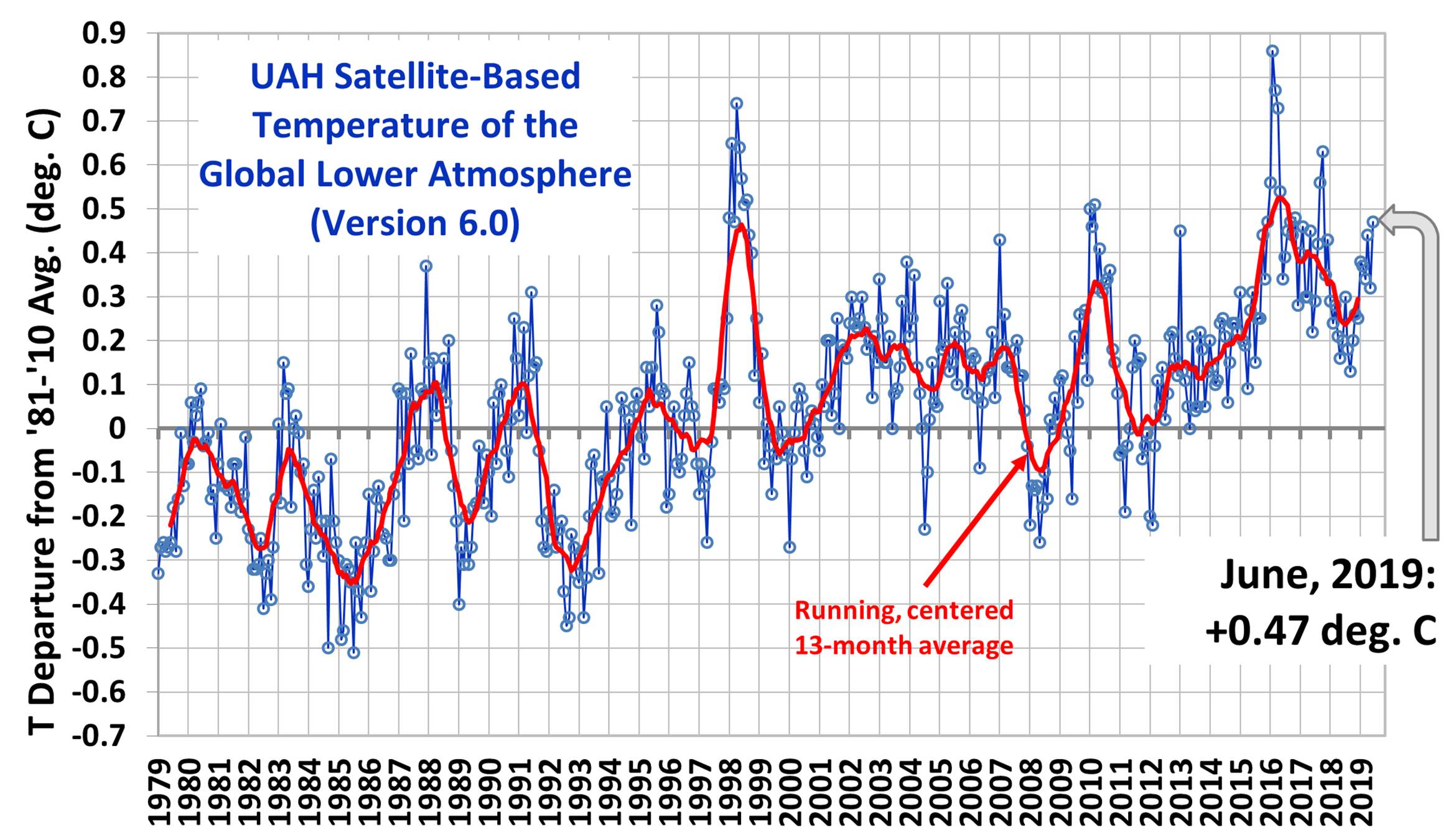
http://www.drroyspencer.com/2019/07/uah-global-temperature-update-for-june-2019-0-47-deg-c/

"The linear warming trend since January, 1979 remains at +0.13 C/decade. This is 1.3 Deg. C/century" (not 3+ degrees as some use)
The current, natural weak El Nino should continue to contribute to a bit of extra warming the next several months......on top of the known greenhouse gas physics from the increase in beneficial CO2.
Meanwhile, there has been little, if any, cooling from the continued relatively weak sun. If there has been any, it has not been nearly strong enough to dominate.
Thanks Larry,
With regards to global cooling from the weak sun. I made the main points here, late month:
https://www.marketforum.com/forum/topic/32669/
Let me just emphasize a few things.
1. I am not saying there is a strong correlation.
2. If there is, I it will never show up on monthly temperature graphs. This is where people get messed up because they underestimate the enormity of the heat storage in the oceans.
When the sunspots drop, people look at global air temperatures and see no corresponding drop, not even a lag. It just would never work that way because the ocean temperatures modulate the air temperatures as noted with global air temperatures spiking up, when heat burps out of the tropical Pacific Ocean during El Nino's and falling when we have La Nina's and LESS heat comes out.
If the sunspots affect cloud cover(via their modulating the solar wind and cosmic rays, which provide condensation nuclei for clouds) and that, in turn causes less or more sunshine, then it will cool or heat the oceans more or less. The vast, vast majority of heat in the oceans came from the heat of the sunshine(not from the air heating the oceans from increasing CO2).
Think of it this way. The much, much stronger solar radiation is able to penetrate deeply into the surface of the ocean with its powerful short wave radiation. With CO2 warming, you have an increase in very weak back radiation(long wave) that can only barely scratch the surface of the oceans. Most of any warming from the atmosphere to the oceans comes from changes in evaporation of water in the ocean. .......so the point is, we know with absolute certainty, that most of the warming in the oceans comes from the sun.
Let's say, hypothetically, there is 1% less solar power to heat the oceans because of the decrease in the sun spots(this is made up to use as an example of how the oceans work).
Instead of it immediately yielding a 1% drop in ocean temperature, which would be immediately transferred to the atmosphere and show up in the global average temperature, you would NOT be able to measure or detect the heat change.
Considering that there are many decades worth of sun powered heat stored in the oceans and its all circulating around and mixing constantly, a tiny change like that means nothing compared to a cycle like El Nino/La Nina that dominates the ocean temperature on shorter time scales.
Then you have longer ocean oscillations that dominate for decades, like the PDO on a 30 year time scale for instance. So the natural ocean cycles dwarf any changes that might come from weaker sunspots on monthly, yearly and even decadal time scales.
However, if there is an affect from the sun that is superimposed on these natural cycles for numerous decades, there is a cumulative affect that adds up very slowly or takes away heat vs before very slowly and could add up to a degree/century but would be impossible to track, especially in the midst of certain greenhouse gas warming from the known physics of CO2.
We know that the climate models have all been too warm and that the warming rate accelerated in the 80's/90's(when the most heat could have been coming out of the oceans from the previous grand solar max) then slowed down.
It's conceivable, in fact very plausible that the slow down in warming is just the start of the affects of the weaker sunspot cycles that started a couple of decades ago.
If that's the case, then we still can't separate the fingerprint out, unless science is able to measure a change in a specific wave length of radiation tied to the solar cycle and tie it to less heating or make a connection..........longer term with the known increase in cosmic rays currently because of the weak sun and more clouds.
If the higher cosmic rays from the weaker solar wind, caused more condensation nuclei for clouds..........and more clouds that resulted in just a small increase in global lower height clouds,(those are the ones that cool) then this might be an identifier.
Sorry for the ramble to others. I know that you get all of this.
The only way that we can say that there is likely NO affect, would be if the warming accelerated the next decade and got up to model predictions, while the sun spots stayed low.
If warming continues to stay lower than models, one can always speculate that there is some cooling from sunspots....though I think the main reason is they have some bad equations from amplifying the warming from H2O.
The main reason that we will know that the affects of the weaker sun are very powerful, would be for us to stop warming completely. To offset that much greenhouse gas warming is very powerful. I would be astounded if we had global cooling with the CO2 going up this much. If that ever happened, then increasing CO2 would be saving us from an ice age and we should be pumping it out faster.